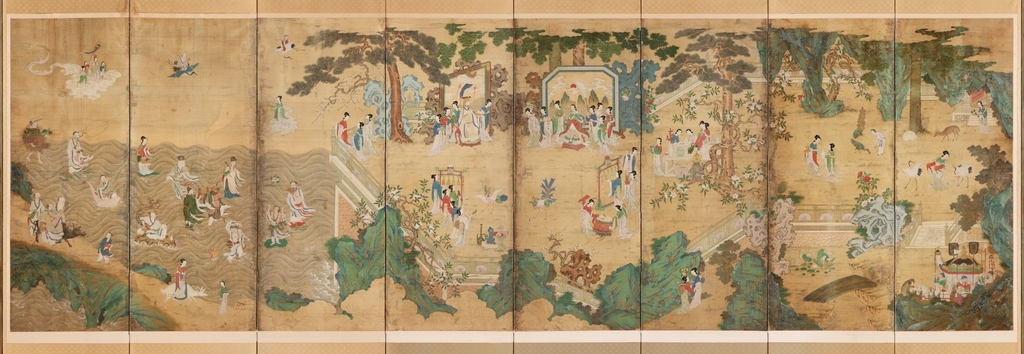 |
Yojiyeondo, a folding screen from the Joseon era (National Palace Museum of Korea) |
Three traditional folding screens, including one which was brought back from the United States last year, are on display at the National Palace Museum of Korea.
The most famous of the three -- Yojiyeondo, or banquet at Yoji in Korean -- depicts an extravagant feast hosted by Seowangmo, a goddess in Chinese mythology. The banquet takes place by Yoji, a huge pond in the Kunlun Mountains which is believed to be the dwelling place of gods. King Mu of China’s Zhou dynasty was said to have attended it.
Paintings of the banquet were popular during the late Joseon dynasty (1392-1910) as it symbolized a long and prosperous country.
The large folding screen on display at the National Palace Museum of Korea measures some 5 meters in width and reflects the majestic heritage from the late Joseon Dynasty, according to the museum.
Yojiyeondo paintings normally feature Seowangmo and King Mu sitting in front of the banquet table. The folding screen at the museum is unique because it does not have a banquet table in front of the two protagonists. Instead, maidens play musical instruments in front of the pair, highlighting the banquet’s festive atmosphere.
The former owner’s father bought the folding screen around 50 years ago when he was serving at a US military base in Korea. Last year, the Cultural Heritage Administration purchased the folding screen at an auction and brought it to the National Palace Museum of Korea.
When the folding screen was first put up for auction last year, cultural heritage experts’ opinions on the date it was created were divided as some decorative silks and paper used for the cover of the folding screen seemed to be from modern times.
An analysis confirmed that Korean newspapers from 1957 and 1959 were stuck to the back of the decorative paper to render them thicker and firmer, meaning that the item was slightly modified before it was taken to the US.
By Song Seung-hyun (
ssh@heraldcorp.com)





![[Exclusive] Hyundai Mobis eyes closer ties with BYD](http://res.heraldm.com/phpwas/restmb_idxmake.php?idx=644&simg=/content/image/2024/11/25/20241125050044_0.jpg)
![[Herald Review] 'Gangnam B-Side' combines social realism with masterful suspense, performance](http://res.heraldm.com/phpwas/restmb_idxmake.php?idx=644&simg=/content/image/2024/11/25/20241125050072_0.jpg)

